Former Human Rights Minister and one time SAARC Secretary General Fathimath Dhiyana Saeed has alleged certain figures behind protests leading to the controversial transfer of power on February 7 had also planned to assassinate former President Mohamed Nasheed.
The allegations from Saeed, who was recently dismissed as the government’s Human Rights Minister, were raised in a personal memoir entitled “Silent inquiry: A Personal Memoir on the issue of the Transfer of Powers on the 7th of February 2012” obtained by Minivan News.
In the document, Saeed describes the reasons for her involvement in the anti-government protests led by then opposition leaders, while also alleging that President Dr Mohamed Waheed Hassan Manik’s government had attempted to manipulate the outcome of the Commonwealth-backed Commission of National Inquiry (CNI) report.
Saeed has also accused President Waheed – then vice president – of taking a direct role in efforts to remove Nasheed from office in the run up to February 7. The president has denied all allegations of his direct involvement in the transfer of power.
The CNI’s findings, welcomed by the Commonwealth, US and the UN, rejected accusations that the present government came to power illegally, despite claims from former President Nasheed that the report’s conclusions were flawed and failed to include key witness statements and evidence.
The President’s Office has today dismissed the allegations that the government had sought to manipulate the CNI report’s as “entirely baseless”, while questioning the motive and timing of the accusations raised by Saeed.
Speaking to Minivan News, Saeed claimed that she had decided to release the information because she believed that the public had a right to know about “such a crime against the state” alleged to have been committed by President Waheed and his allies.
Attempts to assassinate President Nasheed
Saeed’s memoirs recounted a conversation on the morning of February 6 with a “friend and a long-standing political associate” whom she had identified only as “X”.
During her conversation with X, Saeed wrote that the idea of “taking out” president Nasheed came up.
“I understood that to mean an impeachment motion and I knew the opposition didn’t have that kind of numbers so I asked how that was possible. He replied that according to ‘them’ there were many methods, that one of them could go in a technician’s guise, fix the air conditioning and that could do the job. Instantly, I understood that he meant a lethal gas and that he was talking about an assassination,” she wrote.
Saeed said she objected to the idea of an assassinating President Nasheed.
“He dismissed my objections and went on to say that there were people who were ready to shoot Nasheed upfront and they had, among them, the children of those who died on November 3, 1988 [Coup D’état],” she wrote.
Nonetheless, Saeed claimed that the idea of an “upfront” assassination was quickly disregarded, citing the consequences, potentially including an international criminal investigation into an assassination of a head of state.
Saeed went on to allege that should such an attack have been carried out, it would not be the first attempt on President Nasheed’s life.
She accused a group of two to three unidentified military officials in late January 2012 of visiting the then state broadcaster Maldives National Broadcasting Corporation (MNBC) as part of a possible plot.
“They had said the president would be appearing in the [local TV variety show] Heyanbo and would be at the studio for a recording. Then, they had measured the entire distance from the entrance, through the corridors to the studio. They had gone into the studio and drawn diagrams including the wiring above,” she claimed.
“At the time, there had been a hushed and contained talk within select MNBC 1 staff about a staff member being approached to talk about an ‘accidental’ fire from a short of the wires in the studio. MNBC 1 was a very old building with bad wiring which even now causes problems and an ‘accidental’ fire might be regarded as natural. I was given this information from a reliable source, but I will not disclose the source for safety reasons,” she wrote.
A second plan was alleged by Saeed to have been plotted to take place in an event where the Maldives National Defense Force (MNDF) were to display firing of live arms at a ceremonial event.
“The firing was ceremonial and it was to happen with the Commander of the Armed Forces. That is President Nasheed, standing in a designated position. When the preparation for the ceremony was underway, a mid-ranking officer had reported that he had come to know of a plan to shoot the President ‘accidentally.’ This had resulted in an investigation,” she claimed.
However, according to her account, this was quickly dismissed by the officers in charge stating that an accidental firing was impossible because the weapon would be fixed in a particular position. Due to a conflicting schedule with an another ceremony, the MNDF ceremony took place with then Vice President Waheed as the chief guest.
Pre-planned deposing of Nasheed
 Saeed suggested measures were also planned by alleged perpetrators to guarantee then Vice President Waheed’s loyalty towards opposition forces rather than Nasheed’s Maldivian Democratic Party (MDP) in power at the time.
Saeed suggested measures were also planned by alleged perpetrators to guarantee then Vice President Waheed’s loyalty towards opposition forces rather than Nasheed’s Maldivian Democratic Party (MDP) in power at the time.
According to Saeeds’s account, this was achieved through re-igniting the pre-existing conflicts between Waheed and the MDP by sending a group of key opposition figures to meet him. These political figures were involved in the anti-government protests that began on January 2012 following the controversial detention by the military of Chief Judge of Criminal Court Abdulla Mohamed.
“[X] then told me that their first step had been to create a clash between Waheed and MDP in order to ensure that Waheed would not be able to take over MDP and that’s the reason [Progressive Party of Maldives Interim Deputy Leader Umar Naseer] was sent to Waheed few nights back where after his meeting with the Vice President, he stood outside Waheed’s residence and announced to the country that Waheed was ready to take over from Nasheed. X then repeated that everything was now set for Nasheed to be ‘taken-out.’ I asked him when this taking-out would happen and he said soon,” she recalled.
Saeed alleged that it was no coincidence that February 7 was the exact date by which Nasheed had planned to declare all the courts except the Supreme Court unconstitutional by presidential decree.
“If President Nasheed had carried out that move and despite the constitutional challenges, won the move, it would disarm the old guards in the opposition who still had, to some extent, a hold on the judiciary. That could be the reason why February 7th was decided upon – that it was the now or never moment,” she claimed.
“In addition, the ongoing civil alliance protest was a bonus in that it would provide the perfect cover,” she added.
As events unfolded, and after Nasheed officially resigned from office on February 7, Saeed said she appeared on the then opposition-aligned local broadcaster DhiTV. After her appearance, she claimed that she received an SMS by “X” asking her whether she “believed” him now. This SMS message she said did not initially sound suspicious, therefore replied back questioning whether X was “bragging”.
“I remained there, outside the DhiTV building conscious that something very wrong had happened but I couldn’t quite grasp the reality and enormity of what had possibly taken place. The events that had unfolded and that were manifest before our eyes had seemed spontaneous enough,” she recalled.
However, Saeed claimed that she was tormented by the events that took place, not knowing whether to believe that Nasheed left office within lawful grounds or whether something else had taken place behind the scenes.
“The politics was so bitter, so deeply divided and so polarised that if I happened to confide in the wrong person I thought what I had to say would be reported to the wrong people and covered up,” she admitted.
After a heavy-handed police crackdown on pro-Nasheed protesters following his resignation, Saeed claimed that she sent an SMS again to “X” asking what would happen next as Nasheed had gained a large support base after announcing that he was ousted in a coup.
The reply she got from X, Saeed claimed, was not to worry and that Nasheed would now have to be “finished within constitutional and legal bounds” and that “they had many tricks to play”.
“This [SMS Message] took a load off my chest. I understood it to mean that whatever stand-by plans X and his associates may have had and still had, there would be no attempt or no further attempt on President Nasheed’s life,” she wrote.
Military misconduct on February 7

Aside from the assassination allegations she has raised, Saeed also criticised the findings of the CNI report.
She noted particular concern over the report’s silence on the military officials who had joined the rebellion and the CNI’s failure to refer to the concept of mutiny in the Defence Forces Act.
In the account, Saeed also shared her information on what happened within the MNDF barracks on February 7.
“It may not be publicly known but it is known within the military that on the morning of February 7, prior to President Nasheed’s resignation, then Brigadier General Ahmed Shiyam was purportedly appointed as the Acting Chief of Defence Force,” she wrote.
She claimed that there were no legitimate grounds for Brigadier General Shiyam to be appointed as acting chief of defence force by ex-serviceman, Nazim who, “it is clear, lacked the authority to issue such an order”.
She also argued that while the defence base was on red alert, some officers had abandoned the headquarters in breach of the Defence Forces Act.
“It has also been reported that on February 7, when the MNDF was in red alert and when most of the military had been in rank and file, four senior officers, Solih Moosa of MNDF, Captain Amanullah, First Lieutenant, Adnan and Captain Riyaz (BK) had reportedly left their positions, abandoning their duties,” she wrote.
In another incident highlighted in her account, five Special Protection Group (SPG) officers – under the leadership of Staff Sergeant Rikaaz – had defied President Nasheed, openly claimed that they were following direct orders of then Vice President Waheed and attempted to take weapons that were under the control of the marines.
“Other incidents included open defiance and the use of profanities against seniors in breach of the law, protocol and military custom. It was perhaps for this reason that CNI was denied access to the footage from cameras located within the MNDF Headquarters. It would have shown manifest wrongdoing on the part of the military,” she wrote.
Saeed also maintained that information in her account were received from reliable sources placed within the military, who had also conveyed the same information to CNI.
Allegations against former Defence Minister Tholhath
 Saeed’s memoir also alleged that former Defence Minister Tholhath Ibrahim Kaleyfaanu played a pivotal role in the fall of former President Nasheed, claiming that he had breached the Defence Forces Act by exercising his powers beyond legal bounds.
Saeed’s memoir also alleged that former Defence Minister Tholhath Ibrahim Kaleyfaanu played a pivotal role in the fall of former President Nasheed, claiming that he had breached the Defence Forces Act by exercising his powers beyond legal bounds.
“Tholhath also stands accused of bringing several changes within the structure of MNDF to facilitate this move such as reportedly giving promotion three times within three months to Major Adnan to enable him to be placed in the intelligence section,” she alleged.
She also alleged that the defence minister aggravated the already heated situation by throwing a smoke canister towards protesting police on Republican Square during a “stand-off” between the two institutions.
“The move on the defence minister’s part was outside the role of the minister prescribed by section 10 of the Military Act and it was also in breach of established protocol and rules of engagement,” she added.
Saeed further claimed that Tholhath was in “serious debt” at the time.
“Those people to whom he owed money reportedly included mid ranking military officers as well as top military personnel if indeed, Tholhath was in financial hardship and he had been partly assisted out of that hardship, there could be a motive to lie. In the light of the serious allegations involved, it is disappointing that CNI did not examine his accounts,” she claimed.
Government’s hesitance to be bound by the outcome of Commission of National Inquiry
Despite rejecting initial invitations to join President Waheed’s cabinet, Saeed claimed that she gave the administration the “benefit of doubt” and opted to join the government after Nasheed failed to prove his claim of being removed in a “coup d’etat”. She contended that he had been given a “just and fair opportunity” to do so at the time, and that she had genuinely believed that Waheed did not know of any plans to “take out” Nasheed.
She was immediately given the task to defend the new government upon taking the position of Human Rights minister after Maldives had been placed in the formal agenda of Commonwealth Ministerial Action Group (CMAG).
CMAG had at the time called on the government to reconstitute the CNI after it raised serious questions on the impartiality of the initial three-member panel that included former President Maumoon Abdul Gayoom’s defence minister.
She claims that the government had refused to accept a clause in the initial Terms of Reference (ToR) – which stated that all parties will consider the “findings of CNI report final and binding” – that the Commonwealth had proposed with its recommendations to reconstitute the CNI.
“At some point in the talks, the Attorney General Azima Shukoor whispered to me that this clause needed to be removed because if the CNI made a finding of culpability on the part of Commissioner of Police Abdulla Riyaz and Defense Minister Mohamed Nazim and recommended that action be taken against them, a final and binding clause might bar them from challenging the finding in the courts.
“In other words, the ‘final and binding’ clause was removed in order to pave way for Riyaz and Nazim, the [Waheed Government’s] Commissioner of Police and the Minister of Defence respectively, to challenge the CNI’s finding in the event culpability is found on their part,” she wrote.
“In essence, this meant the Government had no intention to be bound by CNI’s findings – unless CNI’s findings suited the Government,” she added.
Defence Minister Nazim’s plan to harass Nasheed’s initial nominee for CNI
After adhering to the demands from the Commonwealth to reconstitute the CNI, the government offered President Nasheed the opportunity to appoint a nominee to the inquiry commission that met an eligibility criterion set out as per the government’s agreement with commonwealth.
Almost all of Nasheed’s names were rejected except that of former school Principal Ahmed ‘Gahaa’ Saeed. Prior to accepting Saeed’s name, the name of former Finance Minister Mohamed Shihab’s daughter Manaal Shihab was floated in the media as a possible nominee of Nasheed.
Saeed claimed in her memoirs that Defence Minister Nazim had urged the government to accept Manaal Shihab’s name and had planned to harass and intimidate her.
“Defence Minister Nazim said we should accept the nomination adding that he had instructed a background check. A background check was normal and legitimate but what he indicated next wasn’t either normal or legitimate. He said they would commence harassment of Manaal from the moment she is appointed to CNI. I remember bantering on to find out whether he really meant that, whether he intended to have President Nasheed’s nominee harassed,” she revealed.
However, Manaal Shihab’s name was withdrawn by the MDP, who had later proposed ‘Gahaa’ Saeed instead. The government at the time had said that even though ‘Gahaa’ Saeed, like all the other nominees proposed by President Nasheed, had not met the government’s eligibility criterion, it would accept the nomination.
However, Saeed argued that the acceptance was made amidst immense pressure from the commonwealth.
Tapping of Commissioner Ahmed ‘Gahaa’ Saeed’s phone
 The memoirs allege that even though ‘Gahaa’ Saeed was not harassed, his phone was tapped and the government had been continuously listening to phone conversations, including a conversation between himself and the Commonwealth’s Special Envoy to the Maldives, Sir Don McKinnon.
The memoirs allege that even though ‘Gahaa’ Saeed was not harassed, his phone was tapped and the government had been continuously listening to phone conversations, including a conversation between himself and the Commonwealth’s Special Envoy to the Maldives, Sir Don McKinnon.
“The implication that the Commissioner’s phone was tapped didn’t surprise me because the Defence Minister had previously mentioned a telephone conversation that [Sir Don McKinnon] had allegedly had with the commissioner. If my memory serves me right, he had even said they had the recording,” she wrote.
According to Saeed’s memoirs, she had previously asked Nazim whether he would or would not ‘bug’ the investigation room where CNI members took the interviews, but Nazim had at the time dismissed such ideas in vague responses.
However, on one particular day after a high level meeting to discuss on the matter of Maldives being on the formal agenda of CMAG, Saeed recalled an encounter with the Defence Minister.
“I don’t remember what exactly led to the subject of bugging. I may have asked as I had done in the past. He said that the place where CNI had conducted its inquiry was bugged, then made a sweeping gesture and said, even that very room was bugged,” she recalled.
President Waheed’s hand tainted
 Saeed claimed she initially believed President Waheed had no knowledge of plans to try and ouster Nasheed prior to his resignation. However, she said to have later discovered that Waheed too had a role in the controversial toppling of Nasheed, claiming that the President had prior knowledge of what would possibly happen in February.
Saeed claimed she initially believed President Waheed had no knowledge of plans to try and ouster Nasheed prior to his resignation. However, she said to have later discovered that Waheed too had a role in the controversial toppling of Nasheed, claiming that the President had prior knowledge of what would possibly happen in February.
In her memoir, Saeed refers to another person, identified as “Y” – described as a “trusted friend” – who had a responsibility to oversee independent institutions of the state.
According to Saeed, she had met the figure to discuss perceived inconsistencies in the Human Rights Commission of Maldives (HRCM)’s report on February 7.
“After a discussion of those issues, I told him that there was another reason which made me doubt HRCM’s conclusion. I then told him everything I had been told by X on the February 6 right down to the ‘Now you believe me?’ text I had received from ‘X’ on February 7. The only thing I didn’t tell him was X’s identity,” she wrote.
Saeed claimed “Y” also shared a secret that surprised her.
“A week before the now disputed resignation of President Nasheed, his Vice President had invited ‘Y’ to his residence for dinner. After dinner, when he was about to leave, when he was bending over to put on his shoes, the Vice President had bent over and whispered into his ears, that things would be difficult in the coming week and whether ‘Y’ would help him. ‘Y’, not suspecting that anything out of the ordinary would happen in the coming week had assured the Vice President that he would indeed help him,” she claimed.
Apart from the conversations, Saeed also alleged that “Y” was offered the vacant vice presidents position should President Waheed ascend to the presidency.
She claimed the unidentified figure had declined the offer, going on to write that “Y” would have made a formidable vice president stating that he was “highly skilled and adept at analysis” and was also “an eloquent speaker”.
Saeed claimed that it was Waheed’s “selective” announcement of findings of CNI report had “finally shattered” her faith in his integrity as president.
Saeed accused Dr Waheed of deliberately omitting the findings on police brutality during the press briefing given by the president announcing the findings of CNI,.
“I felt that it was a crime to stay silent [following the announcement]. I called my technical adviser, one of the most competent lawyers I knew and a trusted friend into my office and asked her whether she thought silence amounted to complicity and whether my silence would bar me from entering paradise on the Day of Judgement,” she wrote.
Saeed also alleged that Waheed had also deliberately ignored calls from President Nasheed during the turmoil of February 7.
“[But] he was in continuous contact with people opposing the government. In fact, he promptly answered my messages and calls on the night of February 6 and morning of February 7. He had even called top ranking military personnel and in some instances, reportedly urged and encouraged them to oppose President Nasheed. He did all that and yet, he did not initiate a call to his own president nor did he answer or return the president’s call when the president attempted to contact him twice,” she wrote.
This action, Dhiyana said was “highly significant” because as vice president Waheed had a “constitutional, legal and moral duty to assist Nasheed” and he failed to discharge those duties and had “willfully ignored those duties”.
Conclusion
“I weighed all this together and I could not ignore the logical conclusion – that key players had engineered and orchestrated the events, that President Nasheed had not resigned voluntarily as he asserted and that Waheed was possibly complicit. I believe further, that had President Nasheed not resigned ‘voluntarily’ that day he would have been killed in a way that would not be apparent as a killing – perhaps ‘accidentally’ in a cross-fire in the MNDF or at the hands of the enraged public in the manner of Amin Didi, the first President of the Republic,” Saeed wrote in conclusion.
She added that only an international criminal investigation that is “independent, impartial and comprehensive” can uncover the truth behind the controversial transfer of power on February 7, 2012.
Government response
President’s Office Media Secretary Masood Imad today dismissed allegations that members of the Waheed administration has sought to cover up or manipulate the CNI’s findings, adding that authorities had no involvement in the final report’s conclusions.
Conversely, Masood said that the government was concerned at the time that the MDP had been appointed a representative on the CNI panel, claiming President Waheed and his administration had no representation or “voice” in the process.
“If I’m honest, we didn’t know what the hell [the CNI panel] would come out with in their findings,” he said.
Masood was also critical of the timing of the allegations being released.
“If [Saeed] was being honest, she would have raised these issues while she was still a serving minister,” he said. “Why is she talking now after quitting or being dismissed from government? This is not very professional and she should be more responsible.”
Likes (0)Dislikes
(0)Dislikes (0)
(0) 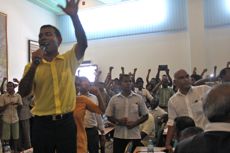 Saeed suggested measures were also planned by alleged perpetrators to guarantee then Vice President Waheed’s loyalty towards opposition forces rather than Nasheed’s Maldivian Democratic Party (MDP) in power at the time.
Saeed suggested measures were also planned by alleged perpetrators to guarantee then Vice President Waheed’s loyalty towards opposition forces rather than Nasheed’s Maldivian Democratic Party (MDP) in power at the time.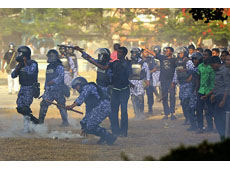
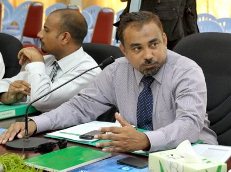 Saeed’s memoir also alleged that former Defence Minister Tholhath Ibrahim Kaleyfaanu played a pivotal role in the fall of former President Nasheed, claiming that he had breached the Defence Forces Act by exercising his powers beyond legal bounds.
Saeed’s memoir also alleged that former Defence Minister Tholhath Ibrahim Kaleyfaanu played a pivotal role in the fall of former President Nasheed, claiming that he had breached the Defence Forces Act by exercising his powers beyond legal bounds.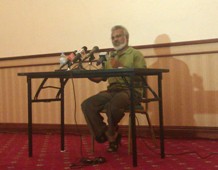 The memoirs allege that even though ‘Gahaa’ Saeed was not harassed, his phone was tapped and the government had been continuously listening to phone conversations, including a conversation between himself and the Commonwealth’s Special Envoy to the Maldives, Sir Don McKinnon.
The memoirs allege that even though ‘Gahaa’ Saeed was not harassed, his phone was tapped and the government had been continuously listening to phone conversations, including a conversation between himself and the Commonwealth’s Special Envoy to the Maldives, Sir Don McKinnon.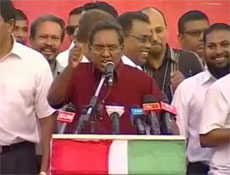 Saeed claimed she initially believed President Waheed had no knowledge of plans to try and ouster Nasheed prior to his resignation. However, she said to have later discovered that Waheed too had a role in the controversial toppling of Nasheed, claiming that the President had prior knowledge of what would possibly happen in February.
Saeed claimed she initially believed President Waheed had no knowledge of plans to try and ouster Nasheed prior to his resignation. However, she said to have later discovered that Waheed too had a role in the controversial toppling of Nasheed, claiming that the President had prior knowledge of what would possibly happen in February.